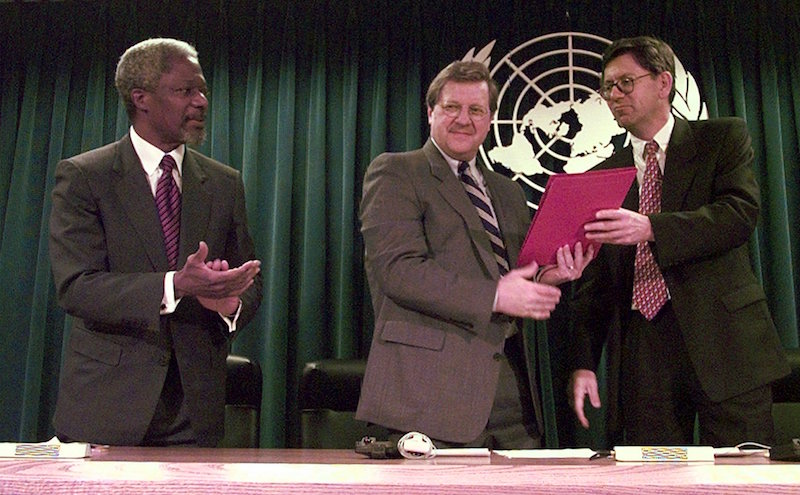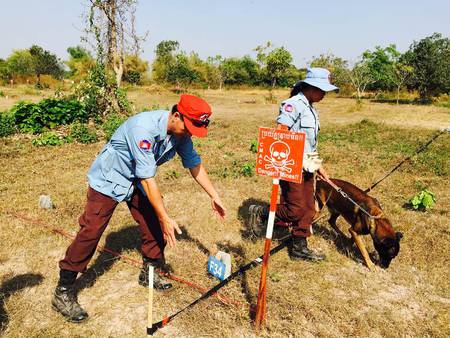|
18.09.2017
Action of those few using landmines should be fully condemned by international community
Geneva, Austria, Oslo — “This is a historic day,” said H.E. Thomas Hajnoczi, Ambassador of Austria to the UN in Geneva who 20 years ago helped lead treaty negotiations and who in 2017, is leading the work of the Anti-Personnel Mine Ban Convention. "Nevertheless, the work is far from over. We call on the small number of States that have not yet adhered to our Convention, to take the right side of history and abolish these weapons once for all. Recent reports of landmine use in and by a small number of States, is still a concern. While these remain the exception, their actions however, should be strongly condemned by the international community,” said the Ambassador. On 18 September 1997, over 100 States concluded three weeks of negotiations in Oslo, adopting a legal international instrument banning the production, use, stockpiling and transfer of anti-personnel mines, ensuring their destruction, and calling for the provision of assistance to the victims of these weapons. This historic movement was the result of an unprecedented effort that included a coalition of international and non-governmental organisations and a core-group of like-minded States. Twenty years since this landmark treaty was adopted, over 51 million anti-personnel mines have been destroyed, 87 of 90 States have declared they no longer hold stockpiled landmines, 30 of 61 States Parties have declared they no longer have mined areas under their territory or control, and the situation for the majority of mine victims is significantly better today than it was two decades ago.“Twenty years on, Austria remains fully committed to achieve a world where all citizens can take safe steps without the fear of landmines,” said Ambassador Hajnoczi. “Our treaty is one of the most effective instruments of disarmament and international humanitarian law. It grew from the imperative to outlaw a weapon that produces casualties, mostly among civilian populations years, even decades after wars end. We are proud to commemorate these past 20 years of partnership between States and civil society. 20 years ago, Norway, was among the core group of States helping to embrace the ambition of a world free of anti-personnel mines, today, it continues to lead a path towards human security,” said Ambassador Hajnoczi.
The then-Minister of Foreign Affairs of Canada, Lloyd Axworthy, center, and Foreign Minister of Norway Bjorn Tore Godal, right, hold the document produced at the Oslo Conference calling for a total ban on anti-personnel mines in 1997. U.N. Secretary-General Kofi Annan, left, applauds. (AP Photo/Adam Nadel).Norway's contribution to mine action“Norway is proud of both, the work we undertook 20 years ago, and the work we carry out today to achieve a common goal: eliminating these inhumane weapons,” said H.E. Hans Brattskar, Ambassador of Norway to the UN in Geneva. ”While much has been achieved, we cannot rest on our laurels. Eliminating the suffering caused by these weapons continues to be a key objective for Norway. We continue supporting mine clearance operations, risk education and victim assistance projects in 20 of the most mine-affected countries in the world. We must however, collectively intensify our efforts to implement the Convention's obligations including mine clearing, destroying stockpiles, assisting the victims, and achieving universal acceptance of the treaty if we are to meet the Convention's ambition of a mine-free world and eliminating the suffering caused by these weapons by 2025,” said Ambassador Brattska.
Norway is one of the top five donors for mine action in the world, contributing over 200 million dollars during the past five years alone. Photo provided by Norway's MFA shows NPA deminers in Cambodia.The Convention has been adopted by 162 States representing over 80% of the world's States.It was adopted in Oslo in 1997, and signed later that year in Ottawa. Demining efforts under the Convention have resulted in the clearance and release of millions of square metres of once dangerous lands and to a reduction in annual casualty rates in most countries. For more information contact the Convention's Implementation Support Unit: isu@apminebanconvention.org. |




